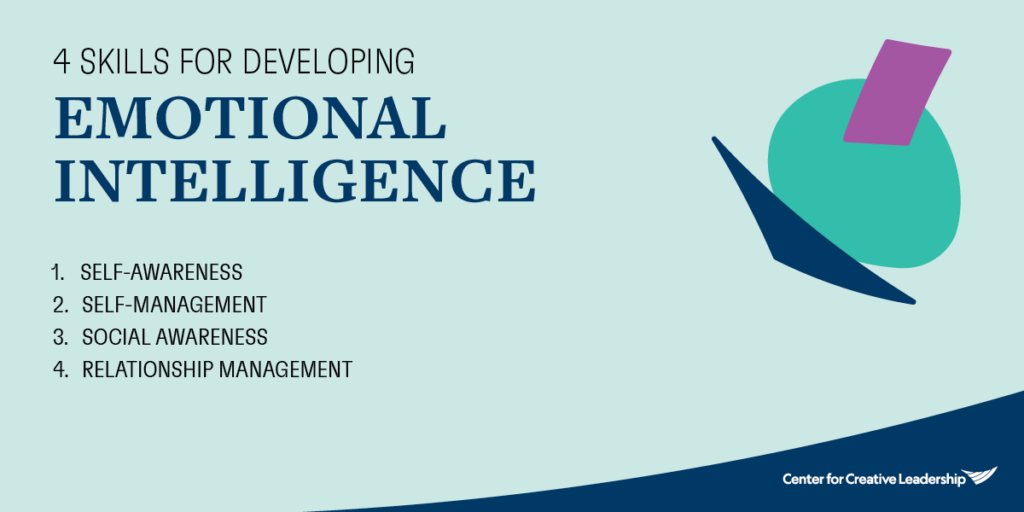Leading With Emotional Intelligence
Time for an honest self-appraisal. Would most people who you’ve worked with you say that you bring out the best or the worst in them?
When I reflect on my own career and the various reasons I left a role, it was always because of a poor relationship with a manager.
For most of us, it’s easy to name the individuals who have brought out the best in us — and maybe easier still to name people who have brought out the worst. These memories are significant because of the way these managers made us feel.
The late Maya Angelou once said, “I’ve learned that people will forget what you said, people will forget what you did, but people will never forget how you made them feel.”
Whether we’re at home or at work, our emotions are woven into our every interaction. They influence how we react to challenges and opportunities. They determine whether or not we collaborate to resolve conflict. They prompt our willingness to forgive ourselves and others.
As we move through our days, our emotions play a role in the amount of effort we demonstrate, what behaviors we display, our psychological health, and our moods.
That’s why emotional intelligence and leadership effectiveness are so closely linked.
Emotional Intelligence and Leadership Effectiveness: What You Need to Know
What Is Emotional Intelligence? Why Is It Important for Leaders?
Popularized by psychologist Daniel Goleman, emotional intelligence is defined as our capacity to be aware of, to control, and to express emotions.
Emotional intelligence enables us as leaders to handle interpersonal relationships judiciously and empathetically.
The ability to connect emotionally with employees and lead with emotional intelligence is essential for leadership effectiveness. In part, that’s because the way a leader makes you feel can impact your engagement, as well as your productivity. Emotions can weave through every work situation you experience, including:
- Change and uncertainty
- Interactions with colleagues
- Conflict and relationships
- Effort and burnout
- Achievement and failure
For me, the managers who have had the strongest impact on my job satisfaction had high levels of emotional intelligence and leadership effectiveness. They brought out the best in me because they were strong communicators, they were empathetic, and they made me feel appreciated.
It’s likely much the same for you.
Leading With Emotional Intelligence
A Higher Emotional Intelligence Quotient Is Linked to Greater Employee Engagement
When organizations go through challenging times like the recent pandemic, employers depend upon employees to help the organization come through strong and equipped for the future. If employees are committed and engaged, they’re more productive, which positively impacts organizational profitability.
The reverse is also true. When I think back to my manager who lacked emotional intelligence and people skills, I remember a time in my life that included daily stress, dissatisfaction, and lack of engagement from the types of assignments I’m normally passionate about.
During that period of my career, my productivity was low. Instead of applying innovation and creativity to my tasks, I was focused on completing my work as quickly as possible — putting in my 8 hours and limiting my interactions with my manager — just to get a paycheck.
Studies have confirmed that disengaged employees can become a liability.
On the other hand, our researchers have found that empathy in the workplace (a factor closely correlated with emotional intelligence) is positively related to job performance. Managers who show more empathy toward direct reports are viewed by their bosses as better performers in their jobs.
So, increasing your emotional intelligence quotient will directly increase your effectiveness as a leader.
4 Key Components of Emotional Intelligence
Want to lead with a higher emotional intelligence quotient? That’s great! But first, make sure you understand that emotional intelligence has the following 4 key components.
- Self-Awareness: The ability to know emotions, as well as your strengths and weaknesses, and recognize their impact on performance and relationships.
- Self-Management: The ability to control both positive and negative emotions and impulses and be flexible and adaptive as situations warrant.
- Social Awareness: The ability to have empathy for others, navigate politically, and network proactively.
- Relationship Management: The ability to inspire through persuasive communication, motivation, building bonds, and disarming conflict among individuals.
It’s also important to understand that all emotion is functional. Whether your own behaviors or the actions of others are driving positive or negative emotions, both are impactful in different ways. Before you can apply new practices and strengthen your ability to lead with emotional intelligence, assess your current emotions and consider the outcome you want. Know that:
- Positive emotions broaden:
- Supporting resiliency
- Improving our thinking
- Undoing negative emotions
- Building new skills
- Creating psychological capital
- Negative emotions narrow:
- An indicator of potential threats
- Calls attention to an issue
- A mechanism of learning
Oftentimes, our negative emotions are provoked when someone or something presses a “hot button.” Hot buttons are people or situations that may irritate you enough to engage in conflict and produce destructive responses. The “hotter” the button, the more likely you may be to experience strong negative emotions, feelings of personal provocation, automatic and impulsive responding, and increased tension. In these times, a leader’s skill at leading through conflict is paramount.
Access Our Webinar!
Watch our webinar, Emotional Intelligence in Leadership: What’s Needed During Unstable Times, and learn ways leaders can leverage their emotional intelligence and leadership skills to improve effectiveness.
How to Increase Your Emotional Intelligence and Leadership Effectiveness
4 Tips for Leading With Emotional Intelligence
To be more empathetic, and to drive higher engagement in the workplace, you will want to increase your emotional intelligence quotient. Taking the following actions will help you build your emotional intelligence and leadership effectiveness.
1. Listen closely and withhold judgement.
It all starts with having strong active listening skills, and striving to try to see the world as others see it. Really listen to, and consider, their perspective, keeping your attitude as open as possible to create a safe space for sharing and a sense of psychological safety at work.
Work to understand the other person’s feelings and reflect them back to the person. As you listen, pay close attention to the values and emotions behind the facts themselves. Communicate your understanding of that person’s feelings to assure people that their feelings and values are really understood.
2. Connect with employees on a personal level.
When you demonstrate a willingness to help your employees and to recognize their efforts, you are leading with emotional intelligence, showing that you care about them as individuals. This act of caring builds trust between leaders and their employees.
Empathy has long been a soft skill that’s overlooked as a performance indicator. Our research, however, has shown that today’s successful leaders are showing kindness in the workplace and are more “person-focused,” making them better able to work well with people from varying teams, departments, countries, cultures, and backgrounds.
3. Unlock motivations.
As important as compensation and benefits are, we know they are not the only things that matter when it comes to keeping employees productive and engaged. These benefits are a part of a larger motivation equation.
Most of the time, understanding what motivates your employees is as easy as asking them — and really listening to their responses. Once you understand your employees’ motives, you can boost employee engagement and motivation, increase job satisfaction, and improve retention.
4. Seek to understand more about others and yourself.
Leading with emotional intelligence requires managers to harness the power of their employees’ diverse experiences and consider people’s different lived experiences to help their teams achieve their full potential.
Your ability to understand where your employees are coming from — including their social identity and how their experiences may have informed their perspectives — demonstrates a willingness to see the world as others see it, without standing in judgment.
Even if you have high emotional intelligence and leadership effectiveness, it’s not easy to get to know every employee below the surface. It’s challenging to see the world as others see it and to accept a variety of perspectives in a nonjudgmental way.
Building those skills requires understanding how aspects of identity can affect the way you lead, and a willingness to learn and recognize your own emotional triggers and weaknesses. Leader effectiveness is constrained or amplified based on how well leaders understand themselves, their awareness of how others view them, and how they navigate the resulting interactions.
So, intentionally increasing your self-awareness is sure to help you improve your emotional intelligence and leadership effectiveness.
A Closing Word on Leading With Emotional Intelligence
One other reason that leading with emotional intelligence is so important: when an entire organization is full of people leading with emotional intelligence front and center, it can create a stronger culture.
Conversations, even hard ones, are more honest, productive, and respectful. Everyone feels a strong sense of belonging and ownership. Empathy and inclusion are particularly imperative for organizational diversity initiatives to be successful.
So, are you and your organization investing in developing the critical “soft skill” of leading with emotional intelligence?
Ready to Take the Next Step?
Foster greater emotional intelligence and leadership effectiveness at your organization with a customized learning journey for your leaders using our research-backed modules. Available leadership topics include Authentic Leadership, Communication, Conflict Resolution, Emotional Intelligence, Listening to Understand, Psychological Safety & Trust, and more.










